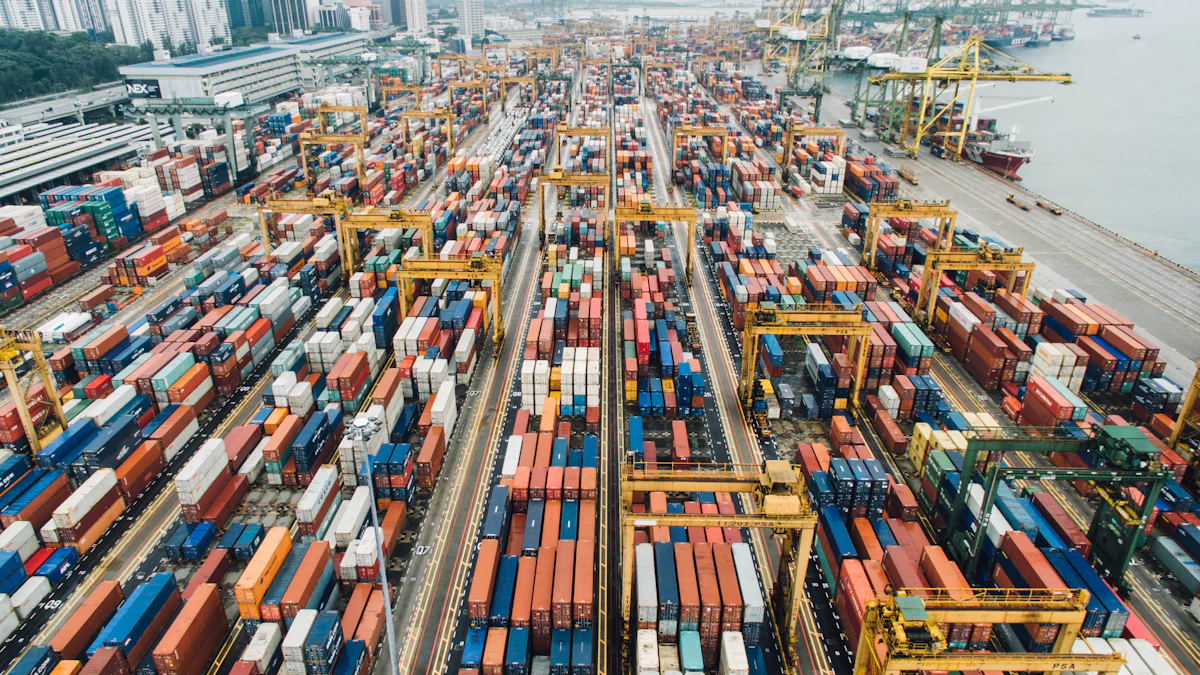The Impact of Automotive News on Supply Chain Management

Staying updated with Automotive News holds immense importance for industry professionals. News in the automotive sector directly influences supply chain management. Recent disruptions have led to delays in the delivery of critical components, particularly microchips, and price peaks due to high demand and low supply. Geopolitical concerns and electric vehicle investments further complicate the landscape. Predictive analytics is gaining popularity across automotive companies, helping optimize different parts of their business and reduce risks. This introduction sets the stage for a detailed exploration of these impacts.
Influence of Automotive News on Production

Technological Advancements
Automation in Manufacturing
Automation has become a cornerstone in automotive manufacturing. Automotive News frequently highlights advancements in automation technologies. Robotics and automated systems streamline production processes, reducing human error and increasing efficiency. Automated assembly lines allow manufacturers to produce vehicles at a faster rate, meeting consumer demand more effectively. Automation also helps in maintaining consistent quality across all units produced.
Integration of AI and IoT
The integration of Artificial Intelligence (AI) and the Internet of Things (IoT) is transforming the automotive industry. AI optimizes manufacturing processes by analyzing vast amounts of data in real-time. This leads to more accurate predictions of production needs and potential issues. IoT devices provide real-time monitoring of machinery and equipment, ensuring optimal performance and reducing downtime. Automotive News often reports on how these technologies enhance supply chain management, making it more resilient and efficient.
Changes in Consumer Demand
Shift towards Electric Vehicles
Consumer demand is shifting towards electric vehicles (EVs). Automotive News regularly covers this trend, noting the increasing investments in EV technology by major automakers. The shift towards EVs impacts production strategies, as manufacturers need to adapt their facilities to produce electric powertrains and batteries. This transition also affects the supply chain, requiring new partnerships with battery suppliers and raw material providers.
Impact of Sustainability Trends
Sustainability trends are influencing consumer preferences and production practices. Automotive News highlights the growing emphasis on eco-friendly manufacturing processes. Consumers are increasingly concerned about the environmental impact of their purchases. Manufacturers respond by adopting greener practices, such as using recycled materials and reducing emissions during production. These changes not only meet consumer demands but also comply with stricter environmental regulations.
Impact of Automotive News on Logistics and Distribution

Global Supply Chain Disruptions
Effects of Geopolitical Events
Geopolitical events significantly impact the automotive supply chain. Automotive News frequently reports on how geopolitical tensions disrupt component availability. For instance, automakers like Tesla and Volvo have suspended production due to component shortages influenced by geopolitical events. These disruptions affect nearly all aspects of supply chains, including logistics and distribution. The resilience of the automotive supply chain faces constant tests from these geopolitical concerns.
Natural Disasters and Pandemics
Natural disasters and pandemics also play a crucial role in disrupting the automotive supply chain. The COVID-19 pandemic caused a global semiconductor shortage, which severely impacted automotive supplies. Major automakers like Volkswagen and Toyota faced production cuts and revenue drops due to this shortage. Automotive News often highlights how natural disasters, such as earthquakes and floods, further complicate logistics and distribution. These events lead to delays and increased costs for manufacturers.
Innovations in Transportation
Autonomous Vehicles
Autonomous vehicles represent a significant innovation in transportation. Automotive News covers advancements in autonomous vehicle technology, which promise to revolutionize logistics and distribution. Autonomous trucks can operate without human intervention, reducing labor costs and increasing efficiency. These vehicles can also optimize routes in real-time, ensuring timely deliveries. The adoption of autonomous vehicles enhances the overall resilience of the automotive supply chain.
Use of Drones and Robotics
The use of drones and robotics is another transformative trend in transportation. Automotive News frequently reports on how drones are being used for last-mile deliveries. Drones can navigate congested urban areas, delivering parts quickly and efficiently. Robotics in warehouses streamline the sorting and packing processes, reducing human error and increasing speed. These innovations contribute to a more efficient and reliable automotive supply chain.
Automotive News and Inventory Management
Real-time Data and Analytics
Predictive Analytics
Automotive News often highlights the growing use of predictive analytics in inventory management. Predictive analytics helps companies forecast demand accurately. This technology analyzes historical data to predict future trends. Manufacturers can adjust production schedules based on these insights. This reduces the risk of overproduction or stockouts. According to a recent survey, 38.7 percent of dealers use AI/ML or predictive modeling data to manage inventory and adjust pricing levels. This adoption leads to more efficient inventory management.
Inventory Optimization
Inventory optimization remains crucial for automotive supply chains. Automotive News frequently reports on advancements in this area. Real-time data allows companies to monitor inventory levels continuously. This ensures that stock levels align with current demand. Companies can avoid excess inventory and reduce holding costs. Real-time monitoring also enables quick responses to market changes. This agility enhances overall supply chain efficiency.
Supplier Relationships
Strategic Partnerships
Strategic partnerships play a vital role in the automotive industry. Automotive News often covers new alliances between manufacturers and suppliers. These partnerships ensure a steady supply of critical components. Strong relationships with suppliers lead to better negotiation terms. This results in cost savings and improved supply chain resilience. Companies can also collaborate on innovation projects. This fosters technological advancements that benefit both parties.
Risk Management
Risk management remains a top priority in supply chain management. Automotive News frequently discusses strategies to mitigate risks. Companies must identify potential disruptions early. This includes geopolitical events, natural disasters, and pandemics. Effective risk management involves diversifying the supplier base. This reduces dependency on a single source. Companies also invest in technologies that enhance supply chain visibility. This allows for proactive measures to address potential issues.
Automotive news significantly impacts supply chain management. Technological advancements and consumer demand shifts drive production changes. Geopolitical events and natural disasters disrupt logistics and distribution. Innovations in transportation enhance efficiency. Real-time data and strategic partnerships optimize inventory management.
Future predictions indicate increased reliance on AI and IoT. Electric vehicles will dominate production strategies. Supply chains will prioritize sustainability and resilience.
Industry stakeholders should invest in advanced technologies. Building strong supplier relationships ensures stability. Proactive risk management mitigates potential disruptions. Adapting to market trends maintains competitive advantage.
See Also
Unlocking the Power of Your Automotive Supply Chain
Mastering Hurdles in the Automotive Supply Chain: Pro Advice
Harnessing Data for Strategic Decisions in Automotive Forecasting
Delving into Robotics Innovation: Supply Chain Transformation
Artificial Intelligence in Supply Chain: Shaping Future Logistics
